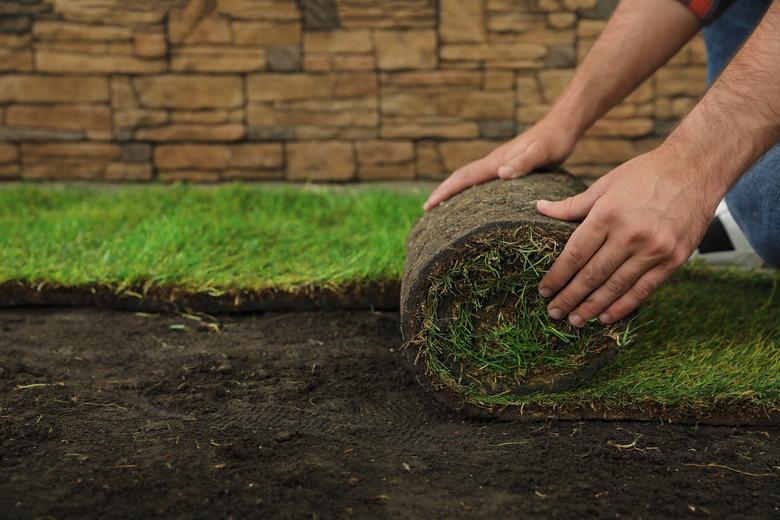The Average Size Of A Piece Of Sod
When estimating how many pieces of sod you need for your yard, you need to know how large the sod is. Unfortunately, this simple question doesn't have a simple answer, as sizing varies from farm to farm. When choosing a type of sod, also keep in mind the thickness, particularly if you are trying to lay the sod beside existing concrete paths or patios.
Average Sod Sizing
When it comes to sod sold in slabs, the standard size is 16 × 24 inches, but a common alternative size is 18 × 24 inches. Sod rolls are longer, usually measuring a total of 9 square feet, with the most common size being 2 × 4.5 feet, though they may be 1.5 × 6 feet. Others sod rolls may be dramatically larger, coming in at 5 × 9 feet — a total of 45 square feet.
The best way to know the measurements of sod sold by a particular supplier is to call and ask what sizes their sod comes in.
Calculating Your Sod Order
To figure out how much sod you need, multiply the length and width of your yard to find the total square footage. Then find out the total square footage of the sod sold at your local distributor and divide the square footage of your yard by this figure. Multiply the minimum amount of sod you need by 1.10 to account for an extra 10 percent of sod to cover waste and to ensure you don't end up short.
As an example, if your yard is 40 × 30 feet and the nearby nursery sells sod rolls that are 2 × 4.5 feet, you will need at least 133 1/3 rolls of sod ((40 × 30)/(2 × 4.5)) to cover the whole space. You would want to order at least 147 rolls (133.33 × 1.10) to ensure you have 10 percent extra to complete the project properly.
Ordering Full Pallets
While companies may sell sod in different sizes, pallets usually hold between 400 and 700 square feet of sod regardless of how it is cut. Ordering by the pallet may be less expensive than ordering by the slab or roll.
To estimate how many pallets you need, start by calling your local supplier and asking how many square feet of sod are in each pallet. Then calculate the square footage of your yard, multiply that number by 1.10 to make sure you have at least 10 percent extra sod, and then divide this number by the square footage of sod in a pallet. For example, if the owner of a 40 × 30-foot yard wants to buy pallets each containing 500 square feet of sod, they will need 1,320 square feet of sod ((40 × 30) × 1.10)), which translates to three pallets (1,320/500).
Average Sod Thickness
Sod comes in a variety of thicknesses, usually ranging between 1 and 3 inches based on the variety of the grass and the harvesting method. If you are purchasing sod to line up with your sidewalk, measure how far below the sidewalk your soil currently is and order a sod of that thickness. For example, if your soil is 2 inches below your sidewalk, this is the ideal thickness for your new sod.
